This is a list of documentary films about agriculture. A documentary film is a nonfictional motion picture intended to document some aspect of reality, primarily for the purposes of instruction or maintaining a historical record. [1] Agriculture is the cultivation of animals, plants, fungi, and other life forms for food, fiber, biofuel, medicinals and other products used to sustain and enhance human life. [2] [3]

A cereal is any grass cultivated for the edible components of its grain, which is composed of an endosperm, a germ, and a bran. Cereal grain crops are grown in greater quantities and provide more food energy worldwide than any other type of crop and are therefore staple crops. They include rice, wheat, rye, oats, barley, millet and maize. Edible grains from other plant families, such as buckwheat, quinoa and chia, are referred to as pseudocereals.
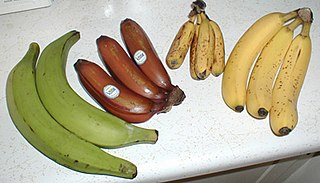
A banana is an elongated, edible fruit – botanically a berry – produced by several kinds of large herbaceous flowering plants in the genus Musa. In some countries, bananas used for cooking may be called "plantains", distinguishing them from dessert bananas. The fruit is variable in size, color, and firmness, but is usually elongated and curved, with soft flesh rich in starch covered with a rind, which may be green, yellow, red, purple, or brown when ripe. The fruits grow upward in clusters near the top of the plant. Almost all modern edible seedless (parthenocarp) bananas come from two wild species – Musa acuminata and Musa balbisiana. The scientific names of most cultivated bananas are Musa acuminata, Musa balbisiana, and Musa × paradisiaca for the hybrid Musa acuminata × M. balbisiana, depending on their genomic constitution. The old scientific name for this hybrid, Musa sapientum, is no longer used.

A farmer is a person engaged in agriculture, raising living organisms for food or raw materials. The term usually applies to people who do some combination of raising field crops, orchards, vineyards, poultry, or other livestock. A farmer might own the farm land or might work as a laborer on land owned by others. In most developed economies, a "farmer" is usually a farm owner (landowner), while employees of the farm are known as farm workers. However, in other older definitions a farmer was a person who promotes or improves the growth of plants, land or crops or raises animals by labor and attention.

Vandana Shiva is an Indian scholar, environmental activist, food sovereignty advocate, ecofeminist and anti-globalisation author. Based in Delhi, Shiva has written more than 20 books. She is often referred to as "Gandhi of grain" for her activism associated with the anti-GMO movement.

The food industry is a complex, global network of diverse businesses that supplies most of the food consumed by the world's population. The food industry today has become highly diversified, with manufacturing ranging from small, traditional, family-run activities that are highly labour-intensive, to large, capital-intensive and highly mechanized industrial processes. Many food industries depend almost entirely on local agriculture, animal farms, produce, and/or fishing.

The Rainforest Alliance is an international non-governmental organization (NGO) with staff in more than 20 countries and operations in more than 70 countries. It was founded in 1987 by Daniel Katz, an American environmental activist, who serves as the chair of the board of directors. The NGO states that its mission is “to create a more sustainable world by using social and market forces to protect nature and improve the lives of farmers and forest communities.” Its work includes the provision of an environmental certification for sustainability in agriculture. In parallel to its certification program, the Rainforest Alliance develops and implements long-term conservation and community development programs in a number of critically important tropical landscapes where commodity production threatens ecosystem health and the well-being of rural communities.
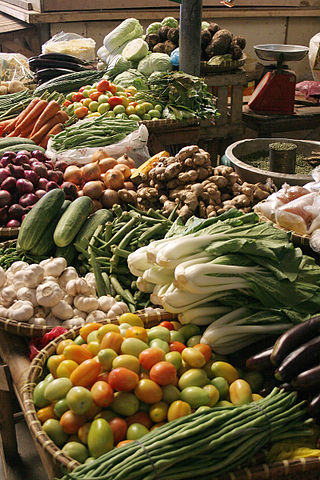
Vegetables are parts of plants that are consumed by humans or other animals as food. The original meaning is still commonly used and is applied to plants collectively to refer to all edible plant matter, including the flowers, fruits, stems, leaves, roots, and seeds. An alternative definition of the term is applied somewhat arbitrarily, often by culinary and cultural tradition. It may exclude foods derived from some plants that are fruits, flowers, nuts, and cereal grains, but include savoury fruits such as tomatoes and courgettes, flowers such as broccoli, and seeds such as pulses.
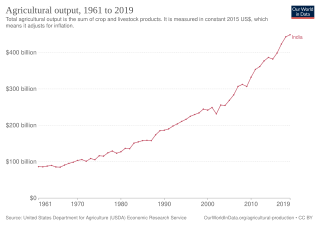
The history of agriculture in India dates back to the neolothic. India ranks second worldwide in farm outputs. As per Indian economic survey 2018, agriculture employed more than 50% of the Indian work force and contributed 17–18% to country's GDP.

The Future of Food is a 2004 American documentary film written and directed by Deborah Koons Garcia to describe an investigation into unlabeled, patented, genetically engineered foods sold in grocery stores in the United States for the past decade. In addition to the US, there is a focus on Canada and Mexico.

The agriculture of Brazil is historically one of the principal bases of Brazil's economy. While its initial focus was on sugarcane, Brazil eventually became the world's largest exporter of coffee, soybeans, beef, and crop-based ethanol.

Our Daily Bread is a 2005 documentary film directed, co-produced, and with cinematography by Nikolaus Geyrhalter. The script was co-written by Wolfgang Widerhofer and Nikolaus Geyrhalter.
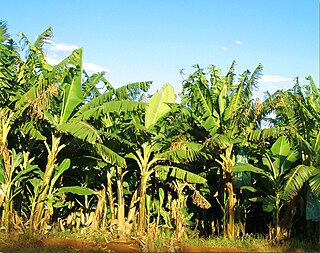
A banana plantation is a commercial agricultural facility found in tropical climates where bananas are grown.
Crop diversity or crop biodiversity is the variety and variability of crops, plants used in agriculture, including their genetic and phenotypic characteristics. It is a subset of and a specific element of agricultural biodiversity. Over the past 50 years, there has been a major decline in two components of crop diversity; genetic diversity within each crop and the number of species commonly grown.
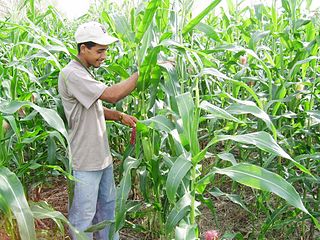
Agriculture in Panama is an important sector of the Panamanian economy. Major agricultural products include bananas, cocoa beans, coffee, coconuts, timber, beef, chicken, shrimp, corn, potatoes, rice, soybeans, and sugar cane.

Ensete ventricosum, commonly known as enset or ensete, Ethiopian banana, Abyssinian banana, pseudo-banana, false banana and wild banana, is an herbaceous species of flowering plant in the banana family Musaceae. The domesticated form of the plant is cultivated only in Ethiopia, where it provides the staple food for approximately 20 million people. The name Ensete ventricosum was first published in the Kew Bulletin 1947, p. 101. Its synonyms include Musa arnoldiana De Wild., Musa ventricosa Welw. and Musa ensete J. F. Gmelin. In its wild form, it is native to the eastern edge of the Great African Plateau, extending northwards from South Africa through Mozambique, Zimbabwe, Malawi, Kenya, Uganda and Tanzania to Ethiopia, and west to the Congo, being found in high-rainfall forests on mountains, and along forested ravines and streams.
Indigenous horticulture is practised in various ways across all inhabited continents. Indigenous refers to the native peoples of a given area and horticulture is the practice of small-scale intercropping.
Costa Rican agriculture plays a profound part in the country's gross domestic product (GDP). It makes up about 6.5% of Costa Rica's GDP, and 14% of the labor force. Depending upon location and altitude, many regions differ in agricultural crops and techniques. The main exports include: bananas, pineapples, coffee, sugar, rice, vegetables, tropical fruits, ornamental plants, corn, potatoes and palm oil.
Flhorban 920 (FB920) is a synthetic banana hybrid developed as a cultivar of banana naturally resistant to Black and Yellow Sigatoka fungi in an attempt to replace the highly susceptible Cavendish banana. Additionally, FB920 has been shown to improve root resistance to Burrowing nematodes.

The Battle of the Harvests is an 18-minute 1942 Canadian documentary film, made by the National Film Board of Canada (NFB) as part of the wartime Canada Carries On series. The film was produced by James Beveridge and directed by Stanley Jackson, who also provided the narration. The Battle of the Harvests shows how the farmers were mobilized worldwide in a battle of harvests to serve the fighting nations during the Second World War. The film's French version title was La Bataille des récoltes.